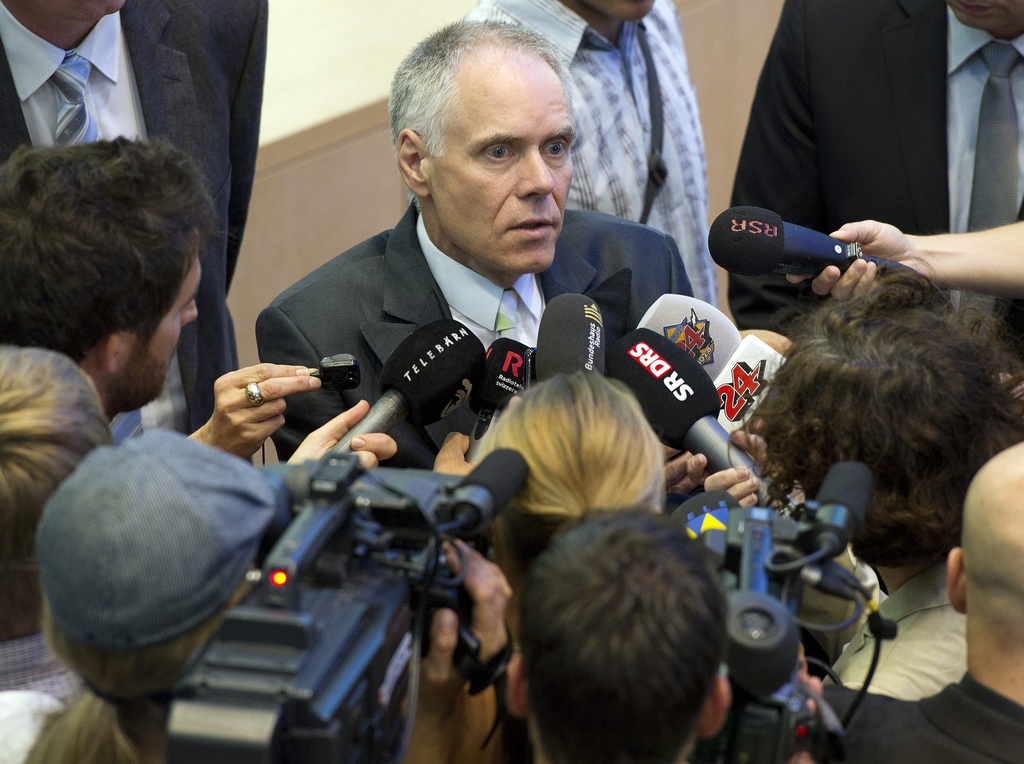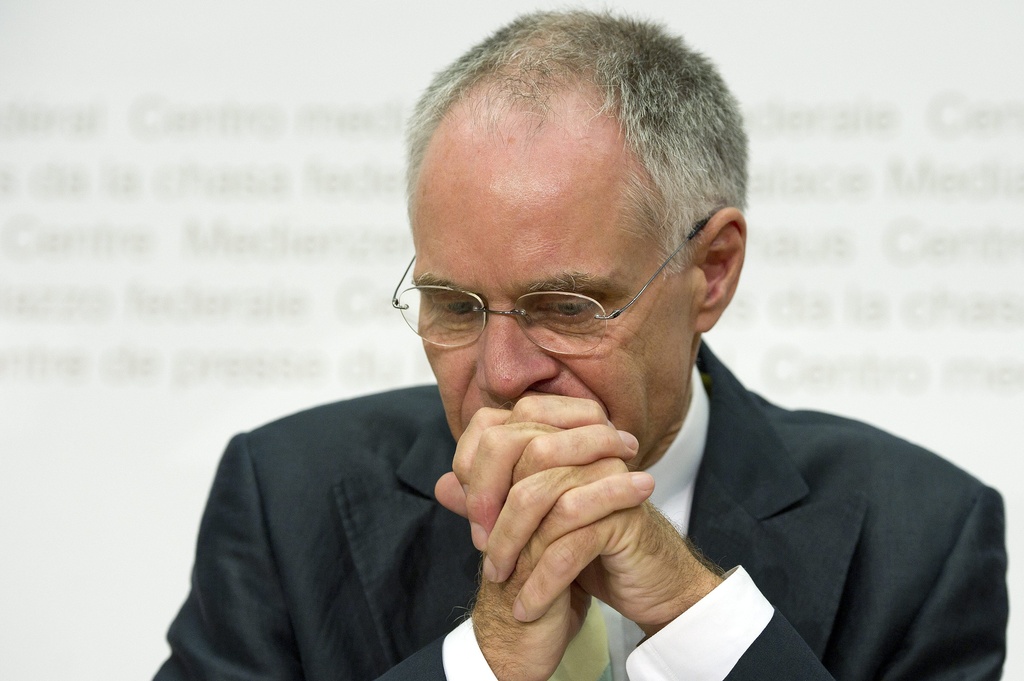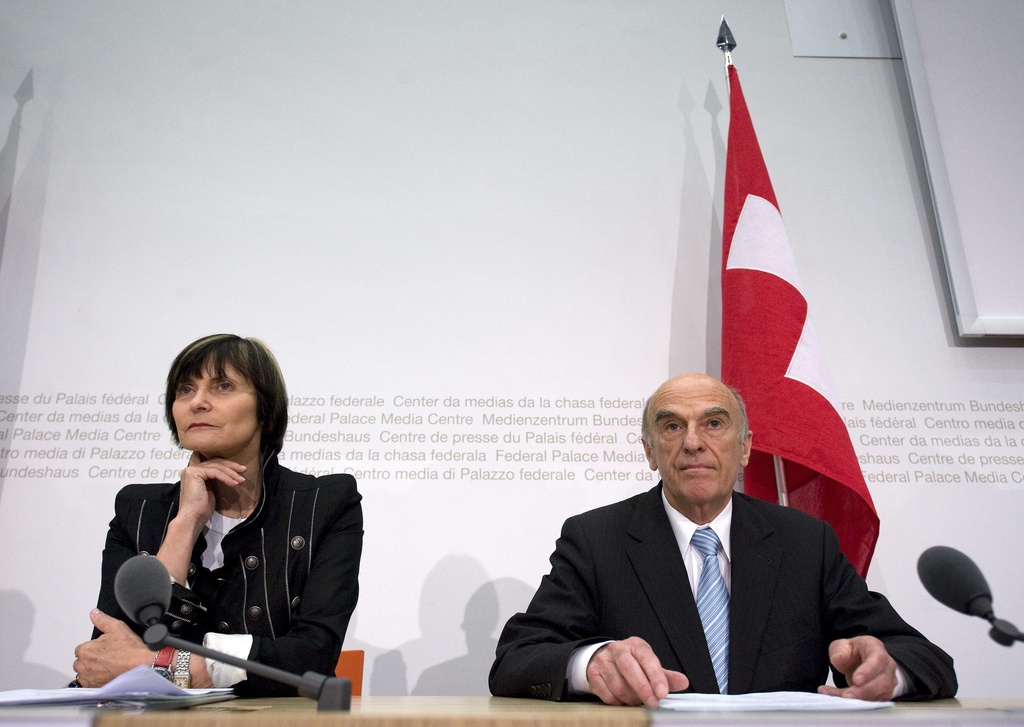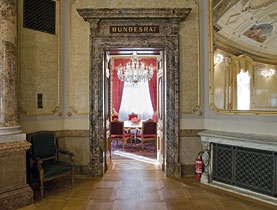Papers feast on Leuenberger departure

Friday’s surprise announcement that cabinet minister Moritz Leuenberger is to step down, is unsurprisingly, the top subject in all Switzerland’s Saturday papers.
They look back over his career, consider his reasons for making the announcement at the beginning of the summer break, and speculate about the future.
They are divided over Leuenberger’s record in cabinet, where for 15 years he has been in charge of transport, environment, energy and communications issues.
“He did not live up to all the hopes placed in him,” says the Geneva-based Le Temps, and the Tribune de Genève attacks what it describes as his indecisiveness.
“The first [decision he has taken], late though it is, was to resign. Since tomorrow is what counts, let us welcome his decision to go.”
The German language Neue Zürcher Zeitung says the reforms of such former state monopolies as the post office, railways and telephone service have “got stuck” under Leuenberger, who in recent times has sometimes given the impression that he has “run out of steam”.
But the German-language tabloid Blick is fulsome in its praise. “No-one can deny that through all these years this intellectual led his huge ministry in accordance with the need to serve the public,” it says.
“It was not easy. Leuenberger’s ministry operates in an environment where it is considered good form to give political cover to uncompromising economic interests… It is a great achievement not to have bowed before this pressure.”
“His record is not as empty as his opponents like to claim,” says the French language La Liberté of Fribourg. “The services provided by the federal railways have sky-rocketed – along, alas, with the prices! The transalpine tunnels and the transfer of road freight to rail are all evidence of visionary policies.”
But even La Liberté points out that under Leuenberger’s watch Switzerland has lost its status as a pioneer in environmental protection. However, it wonders whether that is not rather the fault of the right-wing majority, or the “force of inertia”.
A consensus player?
At a time when the media have been criticising various ministers in what is supposed to be a consensus government for going their own way, they disagree about Leuenberger in this respect too.
The NZZ says Leuenberger had “truly taken on board the ground rules” – even at the cost of annoying Social Democrat party colleagues.
Although it welcomes his departure, the German language “Basler Zeitung” calls him “a tactician who always looked for compromise, and the Tages-Anzeiger of Zurich describes him as a “talented cabinet minister”.
But “24 heures” of Lausanne sees things differently. Leuenberger “ended up symbolising a cabinet that lacks cohesion, and the preservation of power as an end in itself,” it asserts.
Another Lausanne paper, Le Matin, welcomes Leuenberger’s departure, saying the cabinet “urgently needs new blood”.
“The arrival of a new generation of politicians can only be a good thing for a government which has got bogged down in internal squabbling.”
The NZZ agrees: “There’s a need for fresh forces who will act more energetically than Leuenberger did.”
Timing
The timing of Leuenberger’s announcement is a matter for much discussion. His replacement will not be chosen for five months – a delay which the NZZ calls “worryingly long”. It is concerned lest the struggle between potential replacements block the search for a practical political solution.
The Tages-Anzeiger, however, thinks such a long time will give the party time to present its candidates and benefit from media exposure. The French language Le Nouvelliste says Leuenberger is not making things easy for his successor, but he is giving his party “six months of free publicity”.
Another French language paper, the “Quotidien Jurassien” explains his departure now by saying he had become a liability for his party in the run-up to the parliamentary elections in autumn 2011.
But it says that ministerial resignations for reasons of political tactics are becoming “a bad habit”. “They distort the ministerial function,” it adds.
Many papers speculate that Finance Minister Hans-Rudolf Merz, of the centre-right Radical Party, who has been under fire since his abortive attempt to get the two Swiss hostages released by Libya last summer, and who suffered a major heart attack two years ago, will also announce his resignation shortly.
In the complex strategy of cabinet elections, the need to fill two seats would benefit the Social Democrats, says Le Matin, since the Radicals and Social Democrats will vote for each other’s candidates.
“For all that Moritz Leuenberger has criticised other people’s manoeuvrings down the years, his plan is so skilful that it is impossible not to think he prepared it down to the last detail.”
It’s early days, but at the moment the papers generally agree that the front-runners for Leuenberger’s seat are women – which could mean a female majority in the government for the first time ever.
Julia Slater, swissinfo.ch
The multi-party cabinet consists of seven ministers with equal powers. The president is a largely ceremonial post rotated on an annual basis.
Decisions are taken collectively and on the basis of consensus, but it is not a coalition government.
For nearly 50 years the party-political make-up remained unchanged between the four main groups.
Ministers are elected by the two houses of parliament every four years, normally from candidates put forward by the relevant parties.
In 2003, the rightwing Swiss People’s Party, which for the first time was the largest in parliament, won a second seat at the expense of the centre-right Christian Democrats.
However, their controversial figurehead, Christoph Blocher, was voted out in 2007, in favour of Eveline Widmer-Schlumpf, who was subsequently expelled from the party.
Her expulsion led to the establishment of the Conservative Democrat Party.
The centre-right Radicals and the centre-left Social Democrats currently hold two seats.
The People’s Party, the centre-right Christian Democrats and the Conservative Democrats each have one minister.
When a minister steps down, his or her replacement is traditionally chosen from the same party.
However, in recent elections the system has been challenged. The People’s Party and the Christian Democrats want to win back the second seat they formerly held, while the Greens also want a seat.
This has led to the formation of alliances and back-room deals.
Leuenberger has been in charge of transport, environment, energy and communications issues since his election to the cabinet in September 1995.
He is one of the longest-serving ministers of recent years.
He entered local politics in Zurich in 1969 and served as member of the cantonal government in the 1990s.
He sat in the House of Representatives as a member of the centre-left Social Democrats from 1972 to 1991.
The trained lawyer, who will turn 64 in September, held the – largely ceremonial – post of Swiss President 2001 and 2006.

In compliance with the JTI standards
More: SWI swissinfo.ch certified by the Journalism Trust Initiative












You can find an overview of ongoing debates with our journalists here . Please join us!
If you want to start a conversation about a topic raised in this article or want to report factual errors, email us at english@swissinfo.ch.